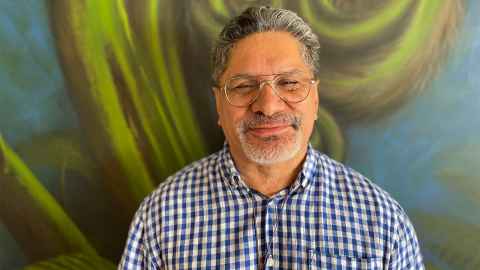Can we ever solve Aotearoa's housing crisis?
16 May 2022
Opinion: Three experts connected with the University of Auckland each have 350 words to answer whether New Zealand can solve its housing crisis.

Dreams and realities of this Morearea
Fred Astle
Ka taea e tātou e whakatika te mōrearea o te whare?
When we ask if we can ever solve the housing crisis in Aotearoa, we need to know the word mōrearea. In short, it means the situation is “bloody alarming and equally dangerous on numerous levels”.
Comprehensive emergency strategies are required, policy that is bold and multi-faceted – the housing equivalent of our approach to the pandemic. The word whakatika means ‘fixing up’, so to rectify the mōrearea or the alarming problem, in this context, means removing the barriers to the Kiwi dream of owning that choice house with a nice yard to mow, or being able to rent a good roof over our heads.
The key player in this crisis is central government and, depending on who you’re talking to, you’ll get different answers on its thinking. Some smart economists might say ongoing rising house prices are not sustainable and banks must restrict lending, particularly to first-home buyers with smaller deposits. And, of course, they just did.

There is a need for more housing stock to meet the homelessness crisis, and more Māori providers to guide the homeless to their options.
A better option could be the government’s Progressive Home Ownership Scheme, where banks and lenders become part of the solution rather than part of the problem.
Talk to those involved in social housing and you’ll hear about people pushed into near poverty through high rents, cost of living rises, unemployment or low skills. They are people who need emergency housing to transition into a long-term home.
But if community housing providers are the ambulance at the bottom of the cliff, here’s a question from the people they support: “Is the top of the cliff, that ‘Kiwi dream’, actually a reality, or is emergency housing really my lot?”
First-home buyers struggling to save will also be asking questions, such as: “Will house prices increase so much that our dream remains just that, a dream?”
If so, what’s clear is there is a need for more housing stock to meet the homelessness crisis, and more Māori providers to guide the homeless to their options. Housing is a human right and we need to alleviate this aspect of the housing crisis.
Future hope will mean doubling down on strategies and policies that work for first-home buyers and community housing providers and allow everyone to live in a healthy home. We must stay the course on all fronts.
Fred Astle (Tainui) is an honorary lecturer in the School of Medicine, director of Kaupapa Māori at the STaR Centre and head of Māori Development and Education at Visionwest Waka Whakakitenga.

Need to go back to the future
Dr Michael Rehm
National’s deputy leader Nicola Willis emphatically proclaimed that her party “believes that New Zealand can once again be a place where hardworking, aspirational, everyday people can see a path to home ownership”. It is difficult to imagine any politician who would not support this ideal. The broad concept of homeownership has been a cornerstone of Western public policy in many countries for generations.
Prior to the wholesale market liberalisation of the early 1980s, the New Zealand government was a primary source of mortgage finance. Trading banks were minnows, however, and represented a mere seven percent of new mortgages in the 1960s. At the time, government loans featured subsidised interest rates and worked in tandem with family benefit capitalisation to provide first-home buyers their equity deposit.
Mortgage finance plays a dominant role in the housing market. When the housing sky was falling at the dawn of Covid, the government and Reserve Bank leapt to the rescue and house prices subsequently exploded.
Why does society permit foreign-owned banks to run the show?
However, when the revamped Credit Contracts and Consumer Finance Act (CCFA) came into force in December 2021, it restricted mortgage credit and began to strangle the housing market. After a few months, the CCFA was being reviewed and will likely be castrated to prop up unaffordable house prices that defy fundamentals.
Finance is housing’s puppet strings, so why does society permit foreign-owned banks to run the show? Why do we condone the siphoning of billions of dollars of easy profit each year from the economy?
Our society needs to make a choice. We must either embrace homes as sacred places where ordinary people can afford a stake in this country, or continue to regard homes as speculative investments for those able to play the market. We cannot have it both ways.
If home ownership is deemed a sacred social good, we must go back to the future and directly support owner occupants, not just first-home buyers, through subsidised government loans floated at, or near, the Official Cash Rate. Loans should be affordably pegged to borrower income, to a maximum of three times the income. Ideally, that same income multiplier would serve as a threshold for lender recourse in case of default and would apply to all mortgages. Banks may bleat, but society would heal.
Dr Michael Rehm is a senior lecturer in property at the University of Auckland Business School.

Economic system is faulty
Dr Elham Bahmanteymouri
My precise answer to the question of whether we can ever solve the housing crisis is no.
There is a direct and clear explanation for my view: what I describe as “commodification of the problem”, a concept derived from my research and work experience with the housing and property market. The commodification of the problem is a hegemonic approach rooted in the capitalist culture. It has shaped a particular lifestyle as “normal”. The concept is not limited to the housing and property market, but it has a clear function there.
We use the shortage of affordable housing as an opportunity to create ‘surplus value’ and ‘surplus enjoyment’. Surplus value is a destabilising drive prevalent in a capitalist ideology that commands enjoyment beyond mere satisfaction. The best example is consumerism.
Capitalist mechanisms hide the origin and root causes – specifically systemic problems within the neoliberal capitalist economy.
Policymakers and politicians claim they wish to solve the housing market problem. They have established a capitalist mechanism including economic and institutional tools and activities, such as budget packages and financial resources, new institutions, educational and research programmes and committees, as well as laws, regulations and policies (such as changing interest rates). But these don’t cure the problem. Instead, the capitalist mechanisms hide the origin and root causes – specifically systemic problems within the neoliberal capitalist economy.
An analysis of the policies that have emerged over the past 40 years shows that the issue of unaffordable housing has become a source of surpluses and the capitalist mechanism’s logic of existence, specifically from the institutional point of view. Flows of capital create inflation (a bubble) in the housing sector, and, inappropriately, the neoliberal economy considers inflation, specifically in the housing sector, as wealth and an asset.
Fundamentally, deregulation and demonising planning as the cause of unaffordability is a neoliberal approach first suggested by Friedrich von Hayek, the ideologue of neoliberalism.
Using a Keynesian logic, I see the whole system of the economy as faulty – wealth is created based on its non-productive activities (bubbles) instead of real products (affordable housing). The measure of success for this system is gauged by surpluses (value and enjoyment) gained from the problem of lack of affordable housing.
This capitalist mechanism is designed to commodify and sustain the problem. Until that changes, the problem won’t be solved.
Dr Elham Bahmanteymouri is a senior lecturer in urban planning in the School of Architecture and Planning.
This opinion piece appeared as the regular Taking Issue column in Ingenio that challenges three academics to answer a curly question in 350 words.
From Ingenio Autumn 2022.
What's a curly question you'd like answered? email: ingenio@auckland.ac.nz